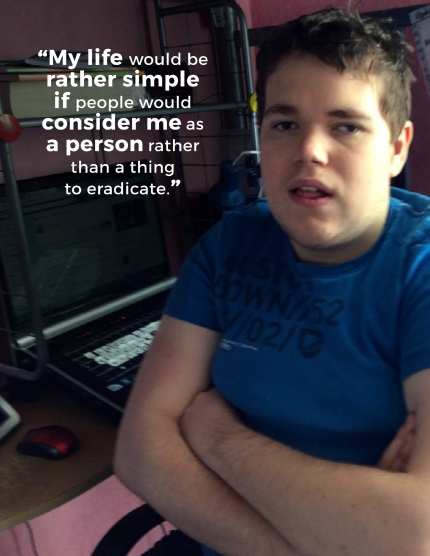
NICOLAS JONCOUR
Article typed by Nicolas Joncour, Piano Student
[First appeared in ZOOM Autism Through Many Lenses magazine, Issue 9, p. 20]
A decent life in France is practically impossible for an autistic student, especially if you are nonverbal like me. In special schools there is no real education, and the psychiatric hospital remains the norm. As my mother encounters more and more difficulties to enroll me in a normal school, the only solution to an equal opportunity is maybe to leave France. I want to go to university to study the Holocaust as people with disabilities are still destined to horrific fates.
My hope is to study history and the Holocaust, a subject that has intrigued me for almost six years. Specifically, Operation T4, which is the eradication of the people with disabilities by the Nazis. Perhaps the Holocaust interests me because I feel the discrimination in relation to my disability. The eyes of others are like deportation camps without return for me.
Without my mother I would likely be in a psychiatric hospital. The right to education definitely remains the domain of utopia. The more I grow, the more I realize I do not have my place in society. I have to fight to deserve to dream. My disability, autism and dyspraxia, makes me look like a mentally-challenged person. People talk to me as if I am a small child, and they watch my gestures as if I am a monster.
The reality is that all their looks are like the slam of a cattle wagon door. My connections towards the victims of Operation T4 are very strong, and my reality joins their fatal destiny. I have faith that helps me, and God gives me so much love that I do not feel alone. I think I have the right to denounce my condition and my social discrimination as long as I would suffer of it. The right to a dignified life is my fight, and I recently joined the ENIL Youth Network to create change. Nonverbal autistic people demand recognition of their right to a real education.
My life would be rather simple if people would consider me as a person rather than a thing to eradicate. I want my intelligence to be recognized without having to meet the low expectations of people who doubt me. The peculiarity of my disability is that I understand very well what kind of people I have to deal with. The inability to defend myself makes me vulnerable to all attacks. Not being able to express oneself orally is a very hard way to live.
People do not consider my written prose without doubt. Not even my relatives who do not understand autism. To be recognized, mentalities must change, and the way we move, having no eye contact and no speech, shouldn’t exclude us from living a fulfilled life. For this to happen, we need the right to education, an education which mustn’t be negotiable and should be accessible to all.
Nicolas Joncour is a 16-year-old nonverbal autistic student who types. He lives in France and is homeschooled and in mainstream school for a few hours per week.
Follow him on Facebook and visit his blog.
Thank you Nico, what a great article! In regard to acceptance I feel grateful to live in a place like New Zealand where people are very accepting of my non-verbal autistic son who is 15. The people are so nice. I think it’s the same in the United States. But in Europe I know it is not so good. But it’s not perfect here either because we have the same problems with trying to get an education. At the moment we have a campaign by teachers and parents of children with disabilities to try to get a better education for them.
Thank you so much for your insights. I am currently working on a proposal for how to regulate what is known as “private eugenics”, a developing practice that screams for (a brake and) for better regulation, in my humble view. It is the spontaneous and surprising result of an EDX course I decided to take. Not easy to do. I don’t know whether my efforts will ever make a difference but if I don’t make them, they certainly won’t.
Particularly the input from persons like you is badly needed, people with the types of disabilities that (some) other people are trying to eradicate. What you write needs to be heard by many more people:
“My life would be rather simple if people would consider me as a person rather than a thing to eradicate. I want my intelligence to be recognized without having to meet the low expectations of people who doubt me. The peculiarity of my disability is that I understand very well what kind of people I have to deal with.”